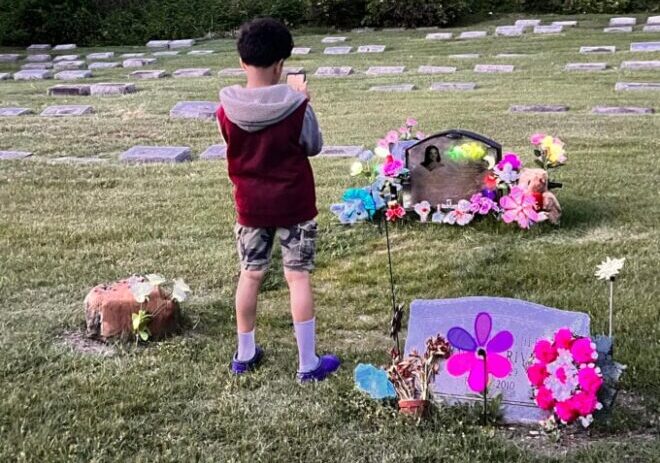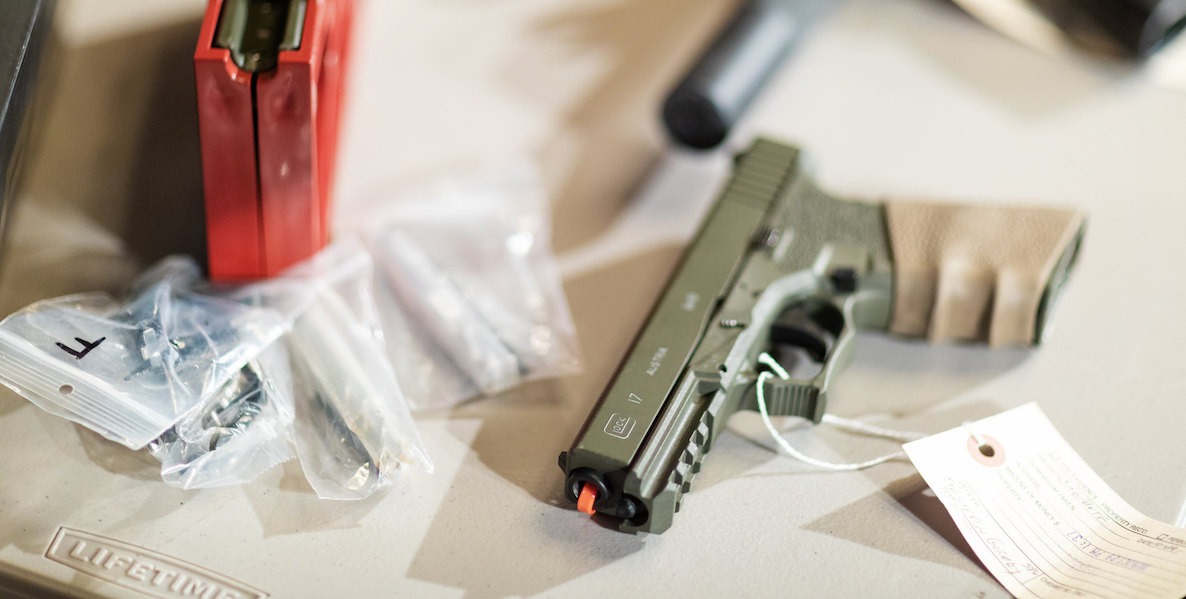In the last several weeks of Sahmya Heaven Garcia’s young life, she sought a protective order against a former boyfriend who had become her stalker.
Despite her vigilance, as she walked to work from her South Philadelphia apartment on the morning of November 8, 2022, Garcia’s stalker gunned her down on a street corner, shooting her 11 times with what authorities said was a Glock-styled ghost gun — a self-assembled firearm often sold and purchased online. She was 20 years old.
[Editor’s note: This story was also published by The Trace, a nonprofit newsroom covering gun violence in America. Sign up for its newsletters here.]
The man, Marcus Burney, was a convicted felon who circumvented state law to get a ghost gun; he is serving a 35-to-70-year state prison sentence for Garcia’s murder. Now, her parents have filed suit against the murder weapon’s manufacturer, Polymer80, Inc., the nation’s largest manufacturer of ghost guns.
“These ghost guns changed my life forever, in the worst way,” said Garcia’s mother, Roseann Morrison, a bus driver from Paulsboro, New Jersey. “To lose a child so violently, it has affected me in ways I can’t imagine. It’s a parent’s worst nightmare.”
In less than 10 years, ghost guns have emerged as a leading weapon of choice for criminals, according to law enforcement officials across the country. The weapons have no serial numbers, making them untraceable. Manufacturers can sell the gun kits without running background checks, meaning people legally barred by law from owning guns — including felons, minors, those with mental illnesses, and known domestic abusers — can purchase them with ease.
In Philadelphia, the ghoulish-sounding weapons have grabbed headlines: Two of six firearms seized by police during an April 10 shootout during a Muslim festival in West Philadelphia were ghost guns; in October, a ghost gun was used by a man charged in the carjacking and murder of a 65-year-old man outside a mosque in suburban Upper Darby police said; police shot a man who pointed a ghost gun at them during a June 2022 melee on South Street that left three dead and 11 injured; and, in September 2022, Philadelphia Recreation Department employee Tiffany Fletcher was fatally shot by a ghost gun-wielding 14-year-old boy who was attempting to shoot another teen at the rec center where Fletcher worked.
Grieving families take action
States and cities, including Philadelphia, have responded by filing lawsuits against ghost gun manufacturers and enacting laws aimed at stopping them from doing business. Now, grieving families are starting to take legal action. Ghost gun critics said that in the absence of a national ban, and because of the ineffectiveness of a 2022 Biden administration rule that gun dealers have found easy to skirt, private lawsuits like the one filed by Garcia’s parents represent a potential new front in the fight against ghost guns.
“The system is finally catching up with the crisis,” said Adam Garber, executive director of CeasefirePa, a statewide gun safety organization. “Now we’re seeing the violence that these companies have allowed to happen lead to a public response, in lawsuits on the legal side, and even city ordinances.”

Hector Garcia, Sahmya’s father, said his upbringing in nearby Camden, New Jersey, made him aware of ghost guns before his daughter’s death. The Garcia suit, filed April 10 in the Pennsylvania Court of Common Pleas, accuses Burney and Polymer80 of wrongful death and negligence, and seeks unspecified monetary damages.
It was filed the same week that Philadelphia officials announced that the City had reached an out-of-court settlement with the company, barring Polymer80 from ever selling its products in Philadelphia; requiring it to pay the city $1.3 million over four years; and preventing it from marketing or selling its gun kits in surrounding counties for four years. Jonathan S. Goldstein, the company’s lawyer, denied requests for comment on either suit.
In 2019, ghost guns represented just 2 percent of firearms recovered in criminal investigations across Philadelphia. By 2022, that number had increased by a staggering 311 percent, according to the city’s lawsuit. That year, the Philadelphia Police Department recovered over 575 ghost guns while conducting criminal investigations, while statewide, from 2017 to 2021, Pennsylvania law enforcement officials recovered more ghost guns than in all but three states, the suit said.
“Ghost guns are a nightmare for law enforcement in Philadelphia and across the nation,” Philly Police Commissioner Kevin Bethel says.
These problems prompted the city to join the Giffords Law Center to Prevent Gun Violence and the Hausfield law firm in suing Polymer80 in May 2023. Their suit alleges that Polymer80 and other co-defendants have perpetuated the city’s gun violence crisis and threatened public safety through the illegal sale of its unserialized gun kits.
“Defendants have created, and continue to create, a public nuisance, unduly burdening the city’s law enforcement and public health institutions, and resulting in significant damage and a proliferating threat to the public’s right to health and safety,” the suit says.
How cities and states are tackling ghost guns
Philadelphia’s suit notes the soaring number of ghost guns recovered by law enforcement nationally between January 1, 2016 through December 31, 2021: from 1,758 recovered in 2016 to nearly 20,000 in 2021.
Other cities have reached similar settlements with Polymer80. In Los Angeles, a settlement last year paid the city $5 million and banned the sale of the company’s unserialized products across California. This February, Baltimore reached a settlement to the tune of $1.2 million and a ban on sales across Maryland. A 2022 court ruling in Washington, D.C., barred the sale of the company’s products in the nation’s capital and awarded the city $4 million.
In addition, since 2018, 12 states have enacted laws to effectively ban the sale of ghost guns by requiring the kits to have serial numbers and sellers to conduct background checks: California, Colorado, Connecticut, Delaware, Illinois, Maryland, Nevada, New Jersey, New York, Oregon, Washington and Hawaii. In March, Pennsylvania’s state House approved a similar measure, but the state Senate has not acted on the legislation.
“The lawsuits that cities have brought have been to try to address the harm that they have suffered from companies exploding those purported gaps,” said David Pucino, legal director and deputy chief counsel for the Giffords Law Center. “The state laws have similarly been trying to plug the holes that have allowed this problem with ghost guns to proliferate.”
A new type of legal challenge, from grieving families
The murder of Garcia, who was one of 10 siblings in a blended family, devastated her parents. She survived leukemia as a child. She was funny, full of life, independent, and, at times, private, her parents said in separate interviews. Neither had met Burney, who in 2007 was convicted of drug and firearm offenses and sentenced to four to 10 years in prison, followed by a one-year sentence in 2017 for assaulting a different woman.

“My daughter lost her life for no reason,” Garcia said. “He wasn’t even supposed to have a gun because his record was so messed up.”
In several weeks, the family of Tiffany Fletcher, the city employee who was shot by the 14-year-old in 2022, will file a wrongful-death suit against Polymer80, the family’s attorney said.
“Polymer80 has always argued and maintained that they don’t sell firearms, they only sell firearm parts,” said the attorney, Jordan Howell. “That’s like Ikea saying they don’t sell furniture, they only sell furniture parts.” The City has since renamed the recreation center where Fletcher was shot in her honor.
Garcia said his daughter’s murder has convinced him to do whatever he can to bring attention to the dangers of ghost guns. “I’m not done with this,” he said. “I’m going to pull every resource, anything or anybody, that can put a little light onto this situation. This will not stay like this.”
Garcia, who said he’s a concealed weapon carrier in Florida, feels it’s important to know that “guns are not for everybody.” He said if he could speak to those who run Polymer80, he would tell them to stop selling guns to people like the criminal who killed Sahmya.
“Having a gun is a great responsibility, and a lot of people are not aware of that. They’re just not aware. Something has to change.”
Mensah Dean is a staff writer at The Trace. Previously he was a staff writer on the Justice & Injustice team at The Philadelphia Inquirer, where he focused on gun violence, corruption and wrongdoing in the public and private sectors for five years. Mensah also covered criminal courts, public schools and city government for the Philadelphia Daily News, the Inquirer’s sister publication.
![]()
RECENT POSTS ON PHILADELPHIA GUN VIOLENCE BY THE TRACE
Ghost gun. Photo courtesy of Tom Wolf, former Governor of PA.


